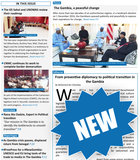
From preventive diplomacy to peaceful political transition in the Gambia
West Africa has witnessed a series of peaceful presidential and legislative elections, held in accordance with the democratic standards and principles recognized by the African Union, ECOWAS and the United Nations.
Definitively breaking with nondemocratic practices dominated by the alternation of coups d’etat and unlimited monopoly of power, Africa, and in particular West Africa, has moved serenely and resolutely towards political change based on the rules and principles of free elections that guarantee the choice of the people.
It is a political reality dictated by an awareness of Africans-citizens as leaders, that the objective of development can only be achieved through a new political culture based on good governance and the respect of rights.
Undoubtedly, there is still some way to go. But no one can deny or underestimate the progress made in the upholding of electoral processes and political change that West Africa has just experienced.
From Nigeria to the Gambia via Benin and Ghana - to mention just a few examples - African leaders and citizens have demonstrated great political maturity and a strong sense of responsibility that must be welcomed and supported.
Apart from some minor incidents between supporters of the various candidates, the last ten elections in the West Africa region were held peacefully and without any violence.
The example of the Gambia is in this sense significant. For a country that has been under autocratic rule for more than two decades, there has been little room for maneuver for peaceful political change.
Who would have thought that elections could be held freely? That the electoral commission could be independent and allow itself to announce results confirming the eviction of the power in place? And finally, who could have foreseen that the Gambians would peacefully vote and wait with a great sense of responsibility for the first results and the end of the political crisis brought about by Yahya Jammeh’s reversal and his rejection of the announcement by the Independent Electoral Commission confirming the candidate of the opposition coalition, Adama Barrow, as the third elected president of the Gambia?
This political maturity and sense of responsibility represent the foundation of the regional preventive diplomacy that eased the departure of former President Jammeh and allowed a peaceful resolution of the crisis.
The joint ECOWAS-UA-UN mediation dispatched to Banjul in the aftermath of Jammeh’s refusal to leave power testifies to the willingness of the countries in the region and of the regional organizations to ensure that the legal framework for peaceful political alternations is scrupulously respected. It also testifies to the determination of the regional organizations to appropriate problems and solutions in a preventive approach with the objective to safeguard peace and stability in the region.
The personal involvement of the presidents of Senegal, Liberia, Nigeria, Ghana, Sierra Leone, Mauritania and Guinea during the crisis illustrates the engagement of African leaders to do everything possible to prevent another conflict, and to maintain the region in a dynamic peaceful change.
The departure without violence of Yahya Jammeh and the inauguration of Adama Barrow is a success of the regional preventive diplomacy. It is also the fruit of the exemplary attitude of Gambians.
But this success of regional preventive diplomacy can only be complete and effective if The Gambia is committed to pursuing the process of political change by abiding by democratic principles.
The decision of the new President Adama Barrow to set up a joint transition team composed of members of the former administration and of the new one is a strong signal of the new authorities’ commitment to the democratic process. The international community who was mobilized during the post-election crisis to assert the rule of law and the constitution must now provide the necessary support to consolidate the political change in The Gambia and to accompany the Gambians in their aspiration for development.
For this reason, the United Nations Office for West Africa and the Sahel (UNOWAS), in the wake of President Barrow’s return to Banjul, has sent an expert in political transition to support the incoming and outgoing administrations, to have a serene transition, and ensure a peaceful change of power.
In the coming days, the joint transition team will report to President Adama Barrow. This will mark the end of the transition period and launch a new era of political alternation.
But the latter cannot constitute an end in itself as political, economic and social challenges are multiple and require a strong political engagement from the new authorities.
In a country where 60% of the population lives in poverty, where one third has to live do with less than $ 1.25 a day, where there is a widening budget deficit that reaches 7% of GDP in 2016, the priority of new Gambian government will be undoubtedly to put in place economic recovery plans and launch structural reforms. The legislative elections scheduled for April 6 will be a real test for the ruling coalition.
Regional preventive diplomacy was crucial to safeguard the will of the Gambian people as expressed in the ballot box, and to strengthen peace in a region that needs it. Peaceful political transition is fundamental to consolidate the gains of political alternation through free elections.
The United Nations, and particularly UNOWAS - in coordination with regional organizations, will continue to support the Gambia in this important phase of its history.
Mohamed Ibn Chambas
Special Representative of the United Nations Secretary-General and Head of the UN Office for West Africa and the Sahel
 UN
UN